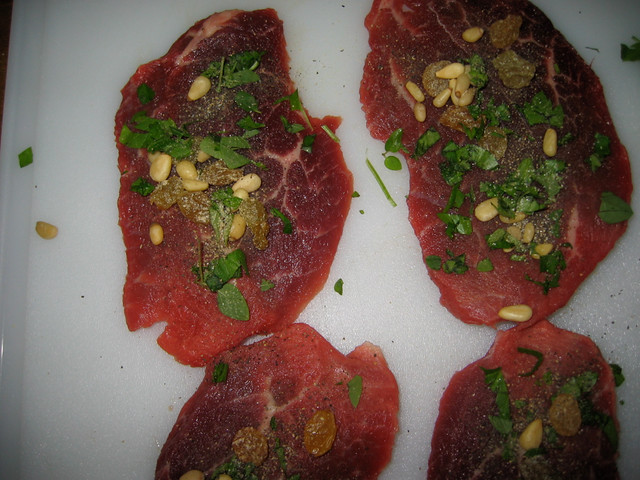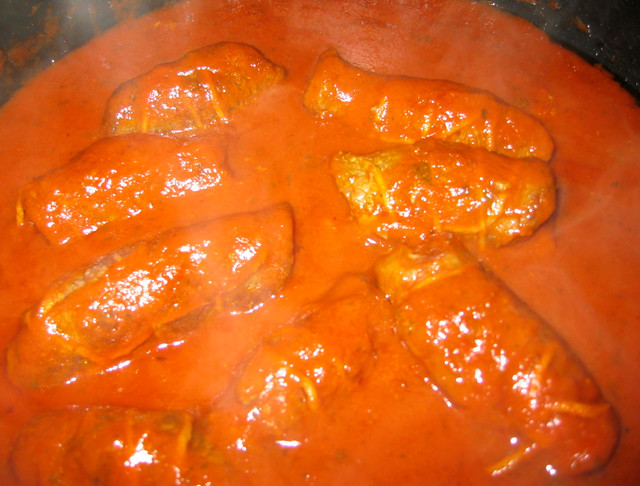A lot of this is true. Maybe most.
The man below came to America because of the Italian salt tax. He was the youngest son of a wealthy man, who had sons and daughters who were educated by private tutors in a manor overlooking the Adriatic Sea and shadowed by Mount Etna. The family grew lemons and olives and the sons were sent to Paris in the summer to become cultured. They ate food from the sea: calamari, shellfish, and eels, as well as lamb and dishes cooked with fruits, pignoli and African spices. Mostly their meals were made for them, but my grandfather enjoyed lounging in the kitchen and learned the art of cooking and, of course, wine-making.

Like all Sicilians, the family did not consider themselves Italian. The language is different, not even a dialect, but a different language. Sicily then, and Sicily now, is contemptuous of Italian rule, resentful. But my grandfather was drafted by Italy and had to go into the Italian army. I'm not sure about my great uncles. I know several had come to the US to make money to buy more land in Sicily and return. Maybe they escaped the draft, I don't know.
The story I remember is that my grandfather was a good marksman, good at taking down faggiani, pheasants. If you shoot one, the others fly away, but the story is that my grandfather was so good he could get others in flight. So the army set him up on a hillside.
People need salt and the Italian government taxed it, perhaps still taxes it. Maybe not. The farmers who lived on the coast would go down to the sea at night to gather salt water and thus evade the tax. The government put soldiers up on the hillsides to fire over their heads and scare them. I don't know, maybe even to shoot them. Whichever, it was intolerable for my grandfather, who despite his privileged upbringing had a fine sense for injustice. This he saw as unjust. So he went to join his brothers in America.
My grandfather met my grandmother, who was from Naples, and they fell in love. Her family did not approve of the match because he wasn't Italian. They did not attend the wedding. He wanted to take his bride back to Sicily, the Sicily he loved with fragrant orchards and sun warmed villas, but she had only known grinding poverty and would not go. And so, rather than lose her, he stayed. The picture up top is him on his wedding day.
My grandfather made out ok, he was athletic and worked as a skilled craftsman. My grandmother worked in a clothing store that catered to Italians, but she had worked in the textile mills as a girl.
A big problem for the Italians was the Black Hand, or Mafia. Not the jovial guys seen on the US TV series "The Sopranos", these were evil men who stood outside the gates of the factories and strong-armed men for part of their paycheck. People paid them or there would be a handprint in black ink on their door and someone would come and bloody them. Some people paid Mafiosi for special favors. They had knives, stilettos, and if a daughter had been dishonored by a man, her family would pay the Mafia to slit his nose and make him so ugly no other woman would want him.
This was the early to mid 1900's. Guns were not very common. A skilled man could do what he needed to do with a knife. If he had a gun, so much the better. But they were rare.
Back to the Mafia and men's paychecks. My grandfather told the men not to give their money to the Mafia. He was an anarchist and did not believe in government, nor religion, did not believe in one person having power over another, and despised the Mafia. One day, when my father was about 7 or 8, the family returned to their apartment and a paper with a black hand was nailed to the door as a warning.
I do not believe my grandfather was frightened.
Time went by and nothing happened. My grandfather continued to urge men not to give their money to the Mafia. One night two men came to the door. Graciously my grandfather let them in, offered them dark red wine, and sent my grandmother and father into the other room. They began to talk when suddenly my father burst in and ran to my grandfather, crying, hugging him. Roughly my grandfather pushed him away. "Bad boy," he said, "go back to your room, this is for men." But it was a ruse. My grandfather had a gun, and my father, as he had been told to do, had brought it and put it in my grandfather's pocket.
So then, with the boy again out of the room, my grandfather drew the gun. Guns, back then, were rare and impressive. "Get out," he said, "and do not come back." Apparently they did, or so I was told. And my father ran in and leaped into his father's lap, proud of the part he played.
My grandfather would have been in his thirties then, here he is in his 60's, with me and my brother. He was a kind and gentle caretaker who never allowed us to be struck or even scolded while he lived. He took me in his lap and read the New York Times to me, out loud. All the News That's Fit to Print said a box on the front page. He died a year or 2 after this picture was taken.
I have his wedding ring which I wear on my largest finger with another gold band to keep it in place.
There are a lot of holes in this story, as there are in stories that are handed down. I'm sure you can find them.











